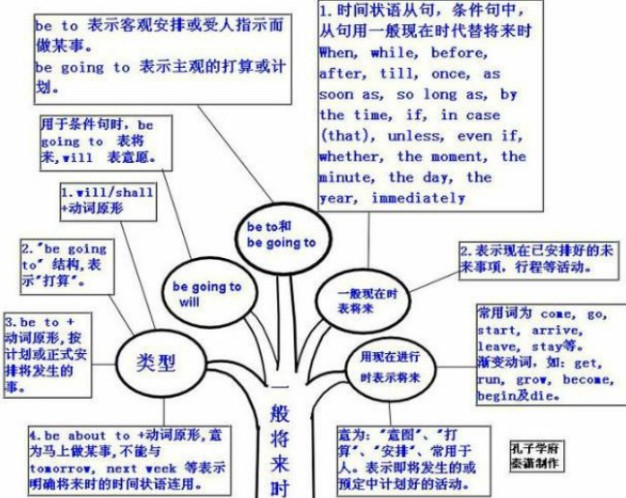本试题 “If city noises _____ from increasing, people _____ shout to be heard even at the dinner table20 years from now.[ ]A. are not kept; will have toB. a...” 主要考查您对一般将来时
一般现在时的被动语态
等考点的理解。关于这些考点您可以点击下面的选项卡查看详细档案。
- 一般将来时
- 一般现在时的被动语态
一般将来时的概念:
一般将来时表示将来某一时刻的发生动作或状态,或将来某一段时间内经常的动作或状态。常与表示将来的时间状语连用。
一般将来时用法:
1)shall用于第一人称,常被will所代替。will在陈述句中用于各人称,在征求意见时常用于第二人称。
例如:Which paragraph shall I read first?我先读哪一段呢?
Will you be at home at seven this evening? 今晚七点回家好吗?
2)be going to+不定式,表示将来。
a. 主语的意图,即将做某事。
例如:What are you going to do tomorrow? 明天打算作什么呢?
b. 计划,安排要发生的事。
例如:The play is going to be produced next month。这出戏下月开播。
c. 有迹象要发生的事。
例如:Look at the dark clouds, there is going to be a storm. 看那乌云,快要下雨了。
3)be+不定式表将来,按计划或正式安排将发生的事。
例如:We are to discuss the report next Saturday. 我们下星期六讨论这份报告。
4)be about to+不定式,意为马上做某事。
例如:He is about to leave for Beijing. 他马上要去北京。
注意:be about to do不能与tomorrow, next week 等表示明确将来时的时间状语连用。
一般将来时知识体系:

一般现在时表将来:
1)下列动词come, go, arrive, leave, start, begin, return的一般现在时可以表示将来,主要用来表示在时间上已确定或安排好的事情。
例如:The train leaves a tsix tomorrow morning. 火车明天上午六点开。
—When does the bus star? 汽车什么时候开?
—It stars in ten minutes. ?十分钟后。
2)以here, there等开始的倒装句,表示动作正在进行。
例如:Here comes the bus.=The bus is coming. 车来了。
There goes the bell.=The bell is ringing. 铃响了。
3)在时间或条件句中。
例如:When Bill comes(不是will come), ask him to wait for me. 比尔来后,让他等我。
I'll write to you as soon as I arrive there. 我到了那里,就写信给你。
4)在动词hope, take carethat,makesurethat等的宾语从句中。
例如:I hope they have a nice time next week. 我希望他们下星期玩得开心。
Make sure that the windows are closed before you leave the room. 离开房间前,务必把窗户关了。
现在进行时表示将来:
下列动词come, go, arrive, leave, start, begin, return等现在进行时可以表示将来。
例如:I'm leaving tomorrow. 明天我要走了。
Are you staying here till next week? 你会在这儿呆到下周吗?
一般现在时的被动语态的概念:
表示的是一般现在时态和被动语态的叠合。构成:(am/is/are +done)
如:This shirt is washed once a week. 这件T恤一周洗一次。
主动语态变被动语态的方法:
1、把主动语态的宾语变为被动语态的主语。
2、把谓语变成被动结构(be+过去分词),根据被动语态句子里的主语的人称和数,以及原来主动语态句子中动词的时态来决定be的形式。
3、把主动语态中的主语放在介词by之后作宾语,将主格改为宾格。
例如:All the people laughed at him.=He was laughed at by all people.
They make the bikes in the factory.=The bikes are made by them in the factory.
记忆歌诀:
宾变主,主变宾,by短语后面跟。
谓语动词变被动,be后“过分”来使用。
含有情态动词的被动语态:
含有情态动词的主动句变成被动句时,由“情态动词+be+过去分词”构成,原来带to的情态动词变成被动语态后“to”仍要保留。
记忆歌诀:
情态动词变动,情态加be加“过分”,原来带to要保留。
例如:We can repair this watch in two days.=This watch can be repaired in two days.
You ought to take it away.=It ought to be taken away.
They should do it at once.=It should be done at once.
被动语态的用法:
1、不知道或没有必要说明动作的执行者是谁。
例如:Some new computers were stolen last night.一些新电脑在昨晚被盗了。(不知道电脑是谁偷的)
This book was published in1981.这 本书出版于1981年。
2、强调动作的承受者,而不强调动作的执行者。
例如:This book was written by him. 这本书是他写的。
Eight hours per day for sleep must be guaranteed. 每天8小时睡眠必须得到保证。
记忆歌诀:
谁做的动作不知道,说出谁做的没有必要;动作承受者需强调,被动语态运用到。
一般现在时的被动语态:
一、被动语态的结构:
主语(动作接受者)+is/am/are+动词的过去分词+(by+动作执行者)
如:Football is played in most countries in the world.
被动语态的句型总结如下:
1、肯定句:主语+be+过去分词+(by~~).
如:The boy is called Jack.
2、否定句:主语+be not+过去分词+(by~~).
如:The baby is not looked after by his father.
3、一般疑问句:Be+主语+过去分词+(by~~)?
如:Is KingLear written by Shakespeare?
4、特殊疑问句:特殊疑词+be+过去分词+(by~~)?
如:What is this kind of sweater made of?
二、被动语态的用法:
1、要表达“被…”、“受…”、“让…”、“遭…”之类的语义。
如:The teachers are well respected.
The child is well loved by people.
2、强调动作承受者。
如:He is known far and wide. 他远近闻名。
3、不知道式没有必要指出动作的执行者。
如: The room is cleaned every day. 房子每天都有人打扫。
4、为礼貌起见避免提及动作执行者。
如:I wonder if I was allowed to introduce myself? 我是否可以做自我介绍?
与“If city noises _____ from increasing, people _____ shout ...”考查相似的试题有:
- Find ways to praise your students often, and you _____ they will open their hearts to you.A. are going to findB. have...
- 指出错误并改正。1. I fell in love with the city the first time when I visited it.____________________________________...
- The water will be further polluted unless some measures _____.A. will be takenB. are takenC. were takenD. had been taken
- Nowadays, too many children________ TV. That's bad for their eyesight and TV also keeps them fromcommunicating with o...
- Is honesty the best policy? We ________ that it is when we are little.[ ]A. will teachB. teachC. are taughtD. will be...
- 短文改错。文中共有10处语言错误,要求你在错误的地方增加、删除或修改某个单词。增加:在缺词处加一个漏字符号(∧),并在其...
- The present situation is very complex,so I think it will take me some time to ________ its reality.A.make upB.figu...
- The couple decided to _____ another two children who lost their parents in the disaster.A.receiveB.adaptC.adoptD....
- In this university a medal with ten thousand dollars ____ gains success in science and technology every two years.A. ...
- Hurry up! The train_______. You know, it________at 8: 30 am.A.leaves; leavesB.is leaving; leavesC.leaves; is leavi...